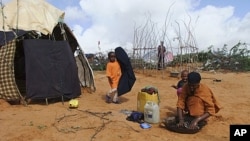The International Committee of the Red Cross (ICRC) is dramatically increasing its emergency operations in central and southern Somalia to assist more than one million people affected by drought and conflict. The organization is appealing for $86 million in additional funding, bringing its total budget for Somalia this year to more than $155 million.
At the beginning of this year, Somalia was the seventh largest humanitarian operation for the Red Cross. The president of the International Committee of the Red Cross, Jakob Kellenberger, say the alarming situation of drought and famine has now moved Somalia into first position, ahead of such countries as Afghanistan, Iraq, Sudan and Libya.
"If we are enlarging the budget to such an extent, we must be very worried… Now the situation is really particularly serious, with hundreds of thousands of Somalis really facing life-threatening food and water shortages," said Kellenberger.
The current desperate situation is the result of 20 years of armed conflict and the worst drought in the Horn of Africa in 60 years. The effects of previous dry spells, high inflation and the worldwide rise in food and fuel prices are further aggravating this long-standing crisis.
The Red Cross is focusing its humanitarian operation in famine-stricken central and southern Somalia. The area is under the control of the Islamist insurgent group Al-Shabab, which has forbidden access to the area to most humanitarian agencies. The ICRC is one of a few organizations allowed to operate there.
Kellenberger dismisses Western concerns about relief being diverted from the people for whom it is meant and falling into the hands of al-Shabab. He says the ICRC has made it clear to the militant group that it is in charge of assessing the situation, and that its staff will be monitoring the distribution of aid to make sure it reaches those who need it.
The United Nations on Wednesday declared three more regions in southern Somalia famine zones and says it expects famine to spread across the entire region within the next four to six weeks.
U.S. aid agencies estimate about 29,000 children have died in southern and central Somalia in the last 90 days. The Red Cross says it cannot confirm this as it has no reliable mortality figures.
The ICRC spokeswoman for the Horn of Africa, Nicole Englebrecht, tells VOA the nutritional state of children under age five has deteriorated alarmingly. She says this is a major reason for the decision to dramatically increase its humanitarian operation in Somalia.
"There we have seen a dramatic increase in malnutrition rates among children under five years old," said Englebrecht. "I can give you an example. What we have seen is that now the emergency threshold of 20 percent malnutrition rates among these children have been reached in southern and central Somalia… That is very high, yes… That is something that we have not seen before. So, it is a dramatic increase."
At the same time, Englebrecht notes the children who reach ICRC facilities are fortunate because they will be treated and will survive. She says it is the many children who cannot reach such help who will die.
About 12.5 million people throughout the Horn of Africa face starvation. This includes more than 2.3 million acutely malnourished children. The U.N. Children's Fund warns more than half a million will die if they do not get help within the coming weeks.
ICRC Scales Up Emergency Relief for More Than 1 Million Somalis
- By Lisa Schlein




